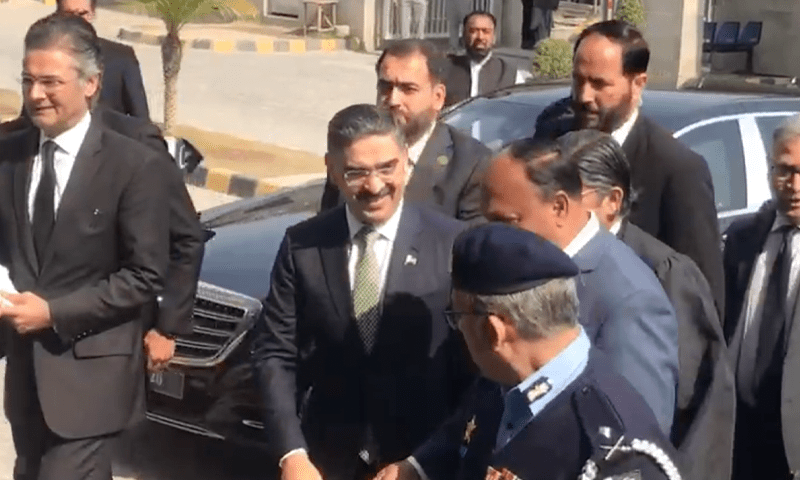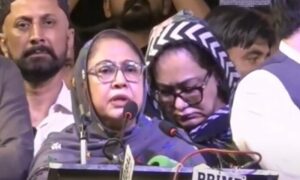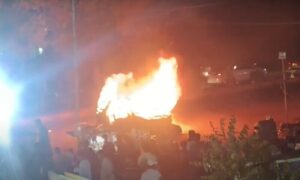After being summoned for a third time, caretaker Prime Minister Anwaarul Haq Kakar on Wednesday finally appeared before the Islamabad High Court (IHC) in a case pertaining to missing Baloch students.
During the hearing, which was presided over by Justice Mohsin Akhtar Kayani, Kakar said it was time that “allegations levelled against the state every other day stop”.
Justice Kayani had resumed hearing a petition regarding the implementation of the recommendations of the Commission of Inquiry on Enforced Disappearances. At the previous hearing, he had remarked that the “purpose of summoning the prime minister was to inquire why the state’s premier is failing in his duties.”
The commission was established in 2011 to trace missing persons and fix responsibility on the individuals or organisations responsible for it.
The IHC had previously summoned PM Kakar on Nov 29. After he had failed to appear before the court, it had warned that a case could be registered against the interim premier and others if they failed to reunite the missing Baloch students with their families.
During the Nov 29 hearing, Attorney General for Pakistan (AGP) Mansoor Usman Awan had informed the court that out of 50 missing persons, 22 had been recovered, while the whereabouts of 28 others were still unknown.
On January 10, Justice Kayani had remarked that a day would come when intelligence officials would also be held accountable and face prosecution for cases. In a subsequent hearing, he had summoned PM Kakar for a second time, observing: “The punishment of enforced disappearances should be the death penalty.”
However, the caretaker premier had again failed to show up on February 19 and was summoned for a third time today.
The court had also issued directives for constituting a joint committee of directors general of the Intelligence Bureau (IB), Inter-Service Intelligence (ISI), and Military Intelligence (MI) for tracing the whereabouts of students from Balochistan who are allegedly missing.
On Tuesday, the federal government had approached the IHC seeking to overturn the order.
Today, Kakar and interim interior minister Gohar Ejaz appeared before the IHC. Attorney General for Pakistan Mansoor Usman Awan and human rights lawyer Imaan Mazari also appeared before the court.
As he was leaving the court premises after the proceedings, a reporter questioned Kakar on defending enforced disappearances. “I defended the allegations against the state in the name of enforced disappearances,” the premier, visibly irked, responded.
The hearing
At the outset of the hearing, Justice Kayani asked AGP Awan whether there were others, apart from the ones included in the previous list, that were missing.
The AGP said that out of the 12 people in the previous list, eight were missing. “Three remain [missing],” he said, adding that nine people were in the Counter Terrorism Department’s (CTD) custody.
“We need more time for the recovery of four people. Twenty-six were missing, out of which two are in Afghanistan,” he added.
The court then asked Advocate Imaan Zainab Mazari-Hazir, the counsel of one of the petitioners, to cross check the AGP’s figures with her list.
“Those in the new list given to us are untraced. Will trace them soon,” the AGP said.
Justice Kayani also asked whether Kakar had seen the record of the case, emphasising that today was the 26th hearing. “We are only seeing the case to the extent of Baloch students,” he remarked.
He recalled that the court was told that some missing persons “had joined the Tehreek-i-Taliban Pakistan” (TTP), some had returned home and some were being traced. He further said that some of the missing persons had returned home after the case was heard.
“Institutions are not above the law. By appearing before the law, you have proven that you are also answerable to the law,” the judge told the interim premier.
“Students across Pakistan are being picked up. According to the reports, a few are going to Afghanistan [and] some are joining the TTP,” the judge reiterated.
“Nine people were picked up by the CTD. A few people were released on court orders. The agencies cleared the missing persons [of the charges] and released them.
“The country’s institutions are answerable for all these affairs. The people’s stance is that agencies or institutions present whomever they arrest before the court,” the IHC judge noted.
For his part, Kakar said, “We all are answerable under the Constitution and working within it as well. The court summoned us and we came.”
The caretaker premier then said he was well aware of the situation in Balochistan and that the country was facing an “armed struggle” in the province.
“Whether the non-state actor is the TTP or anyone else, they are violating human rights. Neither the AGP, the court, Imaan sahiba or I can allow an armed struggle,” he stated.
“We pleaded with them to provide us with the names of the missing persons. Who would be an idiot and a fool to advocate for forced disappearances?” Kakar said.
Recalling an incident of “people being set on fire alive on the Coastal Highway three months ago”, he said that human rights organisations should also criticise the non-state actors and not just the state.
The premier said people were killed due to “linguistic discrimination but everyone remained silent”.
Kakar asserted that his caretaker government “tried its best” to address the issue of forced disappearances. “On what basis do we conclude when there is no evidence before us?” he asked, claiming that “non-state elements” in Balochistan were after his life.
“Do I ask the United Nations for [the safety of] my life? Or from the state of Pakistan and the courts?” he further questioned. The interim PM said that the government had “included 600 non-state actors in the national stream”.
Here, Justice Kayani inquired about the number of people who were punished after being picked up.
“The law is equal for thieves, dacoits and terrorists. It is the state’s and institutions’ failure that people are not presented before courts,” the judge observed.
Meanwhile, PM Kakar said: “They make people board off buses and ask for their names, and kill Chaudhrys and Gujjars. They say to not profile students on a linguistic basis.
“There are deficiencies and flaws in the system. If there isn’t evidence, then who do we sentence and how?” the premier asked. “Around 90,000 people were martyred due to terrorism [but not even] 90 people were punished,” he said.
“Allegations are made against paramilitary forces and counter-terrorism institutions. I am only clarifying about the missing persons. If we ask about missing persons, they only give 5,000 names.
“They themselves do not want to solve the issue either. Considering the entire state the criminal because of them is not right,” Kakar argued.
The caretaker premier highlighted that “even the UN has a procedure [as] they ask who went missing”. “The UN asks ‘Are you Justice Mohsin Akhtar Kayani? Have you gone missing?’,” Kakar said.
Justice Kayani then said, “You are telling me that I will also go missing forcefully?”, to which the PM clarified, “I am giving an example. I am taking the name of Anwaar.”
“This matter should come to an end. The series of accusations levelled against the state every other day should stop. The law will have to see how to deal with non-state and state actors,” he further said.
Justice Kiyani then remarked that no court could grant protection to those who were against the state.
He then asked the prime minister if he could legislate on the matter, to which the latter replied, “I cannot. The new Parliament will have the powers [so] they can.”
“The authority to file a case lies only with the police, not with anyone else. Major terrorists were handed punishments by courts in this country. It is mandatory to present the people being picked up before the courts,” Justice Kayabi said.
Kakar stated that “major political parties” should come together to solve this issue. “Our institutions have made great sacrifices. Every day, the jawaans of the institutions are being martyred.
“Every day, the children of the institutions’ are made orphans but we are silent. Article 5 of the Constitution demands unconditional loyalty from me,” he added.
Justice Kayani went on to say that examples of enforced disappearances were also present in Islamabad. “We do not need to go to Balochistan. We have examples of Islamabad before us. Matiullah Jan is standing in front of you. He was picked up in broad daylight. A video was also present [of it].”
“The point is the same; that everyone should abide by the law and not go against it,” he added. Kakar then said that there should be a case file against “whatever happened with Matiullah Jan”.
At one point during the hearing, Justice Kayani said he had formed a three-member committee on the issue, which would be questioned in the future.
“It is my request that let the executive oversee this as it is its jurisdiction,” Kakar told the judge. The court then directed AGP Awan to submit any further arguments in the form of a document.
Justice Kayani remarked that Mazari had filed the plea and that people had returned to their homes due to the efforts of the AGP and the caretaker government.
“We have always had a complaint that those who return, never come to courts,” the judge said. He noted that the AGP had been “kept with the committee so he could see the matter”.
Separately, Mazari sought the details of those missing persons against whom first information reports were registered. AGP Awan replied that the details will be duly provided.
Subsequently, the hearing was adjourned.











